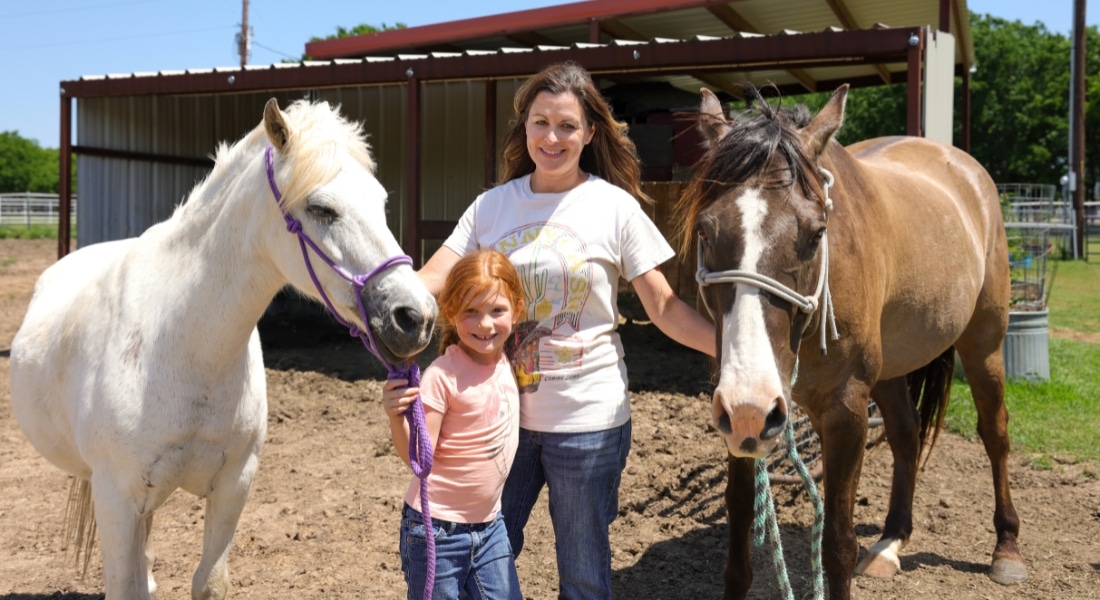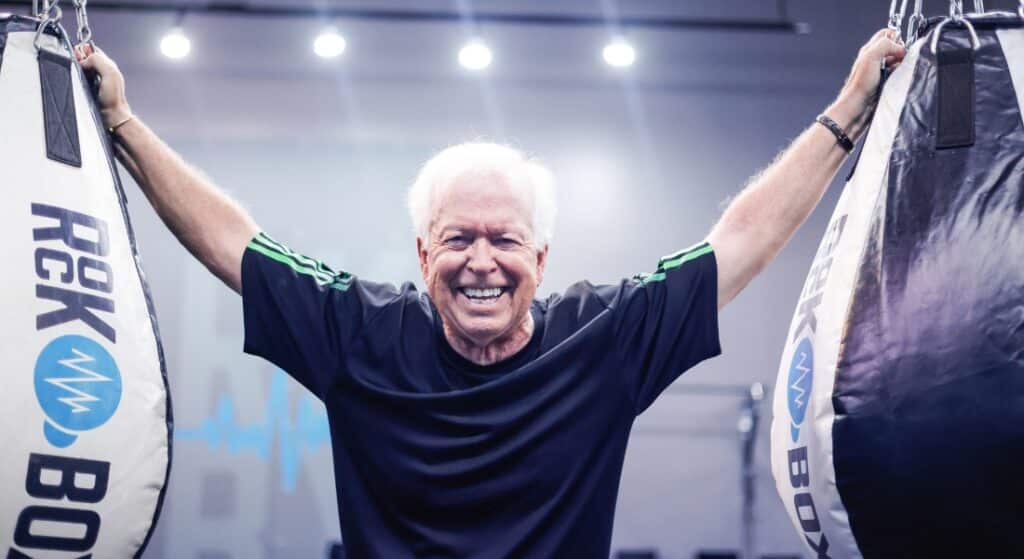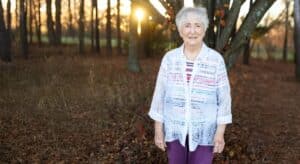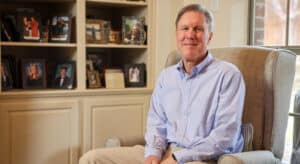Brooke Jayo’s life has revolved around horses ever since she climbed into the saddle at age 8. She later joined a rodeo drill team in her native California and also trained horses alongside her husband.
Nothing can shake that lifelong passion, not even a devastating riding accident three years ago at her home in Rhome or the breast cancer diagnosis that came during her recovery from that fall.
“There’s always something good that can come from anything,” Brooke says, reflecting on that shocking mammogram and the treatment that followed at Methodist Southlake Medical Center. “The experience I had at Methodist Southlake was incredible.”
Brooke’s accident happened in October 2022 — when her horse got spooked and threw her, then landed on her — causing a traumatic brain injury and lasting challenges for the 44-year-old teacher.
“Before my injury, I was the one in charge,” says Brooke, who had to stop teaching but still homeschools her 6-year-old daughter, Harper. “Now, even if someone gives me a little too much information, I can get overwhelmed easily.”
She credits the staff at Methodist Southlake for giving her the grace she needed to process a life-changing diagnosis and the journey that came next.
“When I went into the hospital, I’m sure it was written all over my face: the fear and the insecurity,” Brooke says. “The kindness in the way I was spoken to eased my anxiety. It made me feel very valued at Methodist Southlake.”

Brooke doesn’t hold her riding accident against her horse, Moose.
REMOVING THE TUMOR
Just a month before her accident, Brooke had undergone a routine mammogram that came back clear. But a year later, as her body continued to recover from the fall, follow-up scans turned up worrisome calcification in her breast tissue. A biopsy confirmed breast cancer.
“It was right on the side where the horse had fallen on me,” she says. “I wasn’t really upset, I was just a little bit shocked — like, ‘No, I’m already going through stuff. I don’t need to deal with cancer, too.’ But I’ve learned to trust God and depend on Him.”
Her first instinct was to pursue a mastectomy to remove the breast. But she realized she was acting out of fear after bringing all her questions to Angela Seda, MD, breast surgeon on the medical staff at Methodist Southlake.
“Brooke came prepared with research, questions, and honest concerns,” Dr. Seda says. “My role was to listen with respect and to share my medical expertise to give her the clarity she needed to make well-informed decisions that felt right for her.”
With that guidance, Brooke chose a lumpectomy to get rid of the tumor and to also have her breast implants removed. She thought removing them would allow her body to heal from both the cancer and her fall.
At Methodist, we don’t just focus on your cancer. We care for you as a whole person. Learn more at MethodistHealthSystem.org
TURNING TO MASTECTOMY
Brooke expected her surgery to be the end of her cancer story. Instead, the pathology report revealed more than she bargained for. The tumor, initially thought to be 6 millimeters, was actually 42 millimeters. What’s more, there was a higher risk of recurrence because her margins weren’t clear.
“I was ready to go into that appointment and say, ‘I’m not going to do radiation. I don’t think I need to,’” Brooke admits. “But then I got different information and I had more decisions to make.”
Dr. Seda says no two cancer journeys are alike, and while some women may need only surgery, others need chemotherapy and radiation treatment. Some, like Brooke, might need an additional surgery.
“We took the time to go over every detail together. It was important she felt informed — not overwhelmed — at every step,” Dr. Seda says. “Brooke’s journey reflects what shared decision-making should look like: mutual trust, honest conversations, and the freedom to ask any question without judgment.”

Brooke had Harper (left) and the rest of her family in her corner throughout her recovery.
FEELING SAFE AND VALUED
Brooke’s journey was shaped not only by her medical decisions but by the compassion she experienced at Methodist Southlake.
From check-in to recovery, she remembers how nurses patiently repeated instructions when her brain injury made things harder to process. Before her first surgery, when panic set in under the bright operating room lights, a surgical nurse quietly held her hand and stroked her arm.
“It was like what a mom would do to calm her child,” Brooke says, and it helped her relax and feel secure. “Another patient might not have noticed these details, but my brain not only notices them, it gathers this information to interpret whether I’m safe, whether I’m valued, whether the people around me are genuine and good. All of these were true at Methodist.”
Dr. Seda says she never wants a patient to feel rushed into treatment, and education has proved to be empowering in so many cases.
“Each patient brings a different story and background,” Dr. Seda reflects. “Brooke’s previous trauma reminded me how critical it is to approach care not just with medical expertise, but with sensitivity and compassion.”

Brooke has taught her 6-year-old daughter to ride at home in Rhome.
BACK WITH HER HORSES
Brooke is now cancer-free and balances her recovery with teaching Harper. Having her youngest child at her bedside after surgery meant the world to Brooke, just as it did to Harper, who needs all the hugs she can get after seeing her mother go through so much in the past few years.
“She has the best hugs,” says Harper, who shares her mother’s love for horses. “That’s my favorite thing about Mommy.”
Brooke also treasures the support of her husband, Jesse, her identical twin sister, and her older children, Logan and Taylor, and Taylor’s husband, Chase. Her own mom often travels from California to help, and her community has rallied around her with meals and prayers.
“If I didn’t have this support system, I’d be in a very different place right now,” Brooke says. “God equips us with what we need to get through it.”






